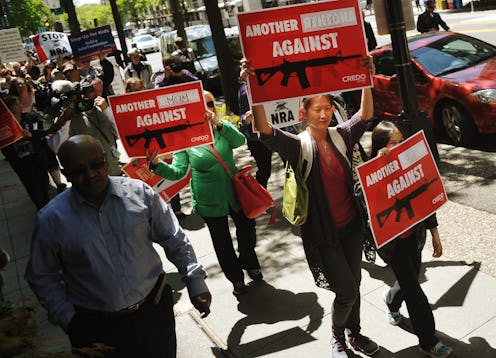News
Senate Blocks 4 Gun Control Bills After Orlando
The Senate rejected not one, not two, but four separate gun control bills on Monday. It was a dark reminder that Congress, for all of its general inefficiency and gridlock, is particularly stubborn when it comes to guns. Not even the worst mass shooting in American history could compel the legislative branch to act. But the four gun control bills blocked after the Orlando shooting were all very different, and it’s worth looking at them individually.
Senate Democrats proposed two bills in response to the Orlando massacre. One called for universal background checks for firearm purchases, while the other focused on preventing suspected terrorists from buying guns. In response, Senate Republicans put forth two counter-proposals. With a couple of exceptions, senators voted along party lines, and because all of the measures needed 60 votes to pass, all four bills failed.
The first Democratic bill would have required federal background checks for all gun purchases in the U.S., including at gun shows and over the internet. It was co-sponsored by Chuck Schumer, Richard Blumenthal, and Chris Murphy, the last of whom led the Democrats’ filibuster on gun control the week before. A similar bill had been rejected by the Senate in 2013 after the Sandy Hook shooting.
The Republican proposal, by contrast, would have directed more resources to the existing National Instant Criminal Background Check System. It wouldn’t have expanded background checks to cover additional scenarios, such as gun show purchases. The measure, largely written by Sen. Charles Grassley, would have also required the Attorney General to conduct a study on the causes of mass shootings.
The second Democratic bill would have empowered the Justice Department to ban suspected terrorists from purchasing guns, including anybody who’d been the subject of a terror investigation during the previous five years. A law like this would have prevented the Orlando shooter from buying a gun, because he’d been on the FBI’s terror watch list from 2013-2014, but was subsequently removed.
In response to this, Republicans proposed a narrower bill, which would have given the federal government less latitude in preventing firearm purchases by suspected terrorists. It would have allowed the Attorney General to delay the sale of a gun for 72 hours to individuals suspected of terrorist activity. The Justice Department could halt the purchase indefinitely only if, during those 72 hours, it obtained a court order blocking the sale.
It’s not surprising that Senate Republicans voted against the Democrats' bills. That’s what Senate Republicans do, after all. But why, you might ask, did Democrats vote against the modest gun reforms proposed by the GOP?
The answer involves a combination of policy preferences and political considerations. On the one hand, many Senate Democrats legitimately didn’t think the Republican proposals were robust enough to make a noticeable dent in gun violence. At the same time, they also wanted Republicans to feel the political consequences of rejecting their proposals. In other words, Democrats didn’t want Republicans to be able to brag about passing “common-sense gun reform” when, in the Democrats’ estimation, the GOP’s bills wouldn’t have been meaningful or effective. Moreover, the passage of a watered-down bill for background checks could lead some Americans to mistakenly believe that universal background checks had been implemented, thus neutralizing the issue’s resonance with Democratic voters.
As a result, none of the measures passed. Sadly, that’s become par for the course in the Senate, even after countless mass shootings.
Images: Pew Research Center/Graphiq (1)
